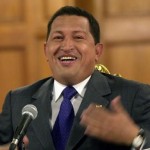How Chavez Lines His Pockets
 Hugo Chavez isn't redistributing wealth from rich to poor, but rather from a business elite to a political elite, and from non-relatives to his own family.
Hugo Chavez isn't redistributing wealth from rich to poor, but rather from a business elite to a political elite, and from non-relatives to his own family.
This New York Times dispatch from Venezuela is fine so far as it goes, but it risks leaving behind a very wrong impression.
The idyll of the Caracas Country Club, a bastion of opulence for Venezuela’s elite, still seems intact.
But perhaps not for much longer.
Beneath the veneer of tranquillity, a feeling of dread prevails. A state newspaper published a study this month saying that if the government expropriated the land of the Caracas Country Club and that of another club in the city, housing for 4,000 poor families could be built on the parcels.
The story invites the reader to think of the Hugo Chavez project in Venezuela as essentially egalitarian: concededly authoritarian and lawless in its egalitarianism, but still a project to redistribute from rich to poor. US politics being what they are, and US assumptions about Latin America being what they are, some NYT readers may conclude that rough justice is being served. Can't make an omelette without breaking eggs, as the saying goes....
Hugo Chavez is redistributing wealth all right, but not from rich to poor: from a business elite to a political elite, and from non-relatives to his own family. He has succeeded in impoverishing the Venezuelan middle class, but his benefits to the Venezuelan poor take the form of personally distributed largesse a la Eva Peron - or subsidies to the cost of basic necessities that will last only so long as oil revenues remain high. Electricity, running water, reliable roads, effective schools: Chavez has failed to deliver any of these benefits securely to the country's poor. Any social benefit that requires long-term planning, large-scale investment, sophisticated expertise is beyond the range of a regime that governs on old-fashioned caudillo principles of conquer and plunder, while distributing just enough to keep the peons quiet.
Tweet